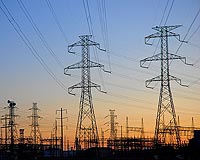 |
Copenhagen (AFP) Dec 15, 2009 Europe turned up the heat on China and the United States Tuesday, demanding the world's two biggest carbon polluters give ground to unlock a pact to tame the monster of climate change. "There are two countries in the world representing half the emissions of the world, and that's the United States and China," said Swedish Environment Minister Andreas Carlgren, representing the 27-nation European Union at the UN climate summit here. "We still expect them both to raise their ambition level for emission reductions, otherwise we won't be able to reach the two degree target," referring to the goal of limiting global warming to two degrees Celsius (3.6 Fahrenheit degrees). European powerhouse Germany likewise pointed the finger. "I have the impression that we are on schedule to get a result on Friday," said its environment minister, Norbert Roettgen. "The main problem is that neither the US nor China want to do the next step now. Both want to keep every option open up to the last hours of the conference ... We don't have much time left." German Chancellor Angela Merkel, due in Copenhagen for the summit finale, said she was "somewhat nervous whether we will manage to achieve everything". A sprinkling of heavyweight leaders arrived ahead of Friday's gathering of around 120 presidents and prime ministers, tasked with sealing an historic deal. British Prime Minister Gordon Brown and Brazilian President Luiz Inacio Lula da Silva were among those expected in the Danish capital on Tuesday. UN Secretary General Ban Ki-moon arrived in Copenhagen after warning that failure would have a "potentially catastrophic consequence." Reflecting deadlock, a new draft text gave no figures for a long-term goal of reducing greenhouse-gas emissions, a peak for emissions, an intended limit to warming, nor on financing for poor countries exposed to climate change. These core questions were farmed out to small parties of ministers, charged with brokering a consensus by Friday. The summit chair cautioned that brinkmanship was inevitable while Danish Prime Minister Lars Loekke Rasmussen, whose country is hosting the 12-day marathon, said he could not "be certain" that an agreement would be reached. The summit is billed as one of the most important gatherings of the post-World War II era. Its goal is to agree an outline deal of national pledges to curb carbon emissions and set up a mechanism to provide billions of dollars for poor countries in the firing line of climate change. If the surge in greenhouse gas emissions is unbraked, Earth will be on course within the next decade for warming that will inflict drought, flood, storms and rising sea levels on tens of millions of people, say scientists. But deep divisions remain over how to pay the bill. Developing countries are demanding their rich counterparts slash their carbon emissions by at least 40 percent by 2020 compared with 1990 levels. Emerging economic giants such as China and India say they are willing to promise voluntary measures to slow their forecast surges in emissions. But they are under pressure to be more ambitious and make their pledges open to international scrutiny. The new draft said that "developed country parties must take the lead in combating climate change" as they were responsible for the "largest share of historical and current global emissions of greenhouse gases." The text added that the "sources and scale of financial contributions" to fund the war against global warming -- and many other issues -- were "to be elaborated", leading Greenpeace to declare that "all the big questions" remained unanswered. US President Barack Obama has offered to cut US carbon emissions by 17 percent by 2020 over a 2005 benchmark, a figure that aligns with legislation put before the US Congress. The offer by the United States, which is the world's second biggest polluter after China, has been widely criticised by other parties as inadequate. But US chief delegate Todd Stern played down the prospects of a change in the US position which has met widespread opposition in Congress. "I am not anticipating any change in the mitigation commitment," he said. "Our commitment is tied to our anticipated legislation and there are elements in that legislation that could result in an overall target or an overall reduction amount that could actually be a fair amount higher, but we're not making a commitment to that right now because it's just uncertain." The conference chair, Denmark's former climate minister Connie Hedegaard, said that negotiations would go down to the wire. "I think that it is with people in this process just like schoolchildren" with homework, she said. "Only when you know that the deadline is there and you cannot escape it, then you have to do it." Share This Article With Planet Earth
Related Links
 NSW Regulators Unleash Power Prices With 60 Percent Price Signal
NSW Regulators Unleash Power Prices With 60 Percent Price SignalGerroa, Australia (SPX) Dec 15, 2009 Pricing regulators have unleashed electricity rates with prices set to leap 60 percent in Australia's largest energy market over the next three years. The decision was presented by NSW State "Independent Pricing and Regulatory Tribunal" as a necessary move to support construction of new power generation and the transition to a low carbon energy base. The move sends a welcome price signal to a mix of privately owned fossil fuel and renewable energy producers - that state owned power utilities face an onslaught of competition. ... read more |
|
| The content herein, unless otherwise known to be public domain, are Copyright 1995-2009 - SpaceDaily. AFP and UPI Wire Stories are copyright Agence France-Presse and United Press International. ESA Portal Reports are copyright European Space Agency. All NASA sourced material is public domain. Additional copyrights may apply in whole or part to other bona fide parties. Advertising does not imply endorsement,agreement or approval of any opinions, statements or information provided by SpaceDaily on any Web page published or hosted by SpaceDaily. Privacy Statement |